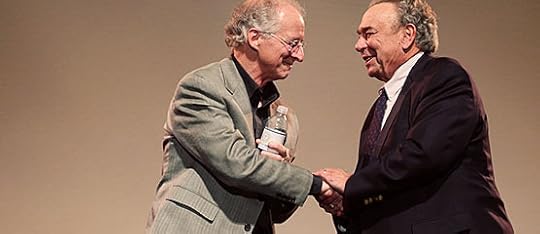Justin Taylor's Blog, page 342
April 5, 2011
The Story of the Bible: In Three Acts
An important part of good Bible reading is simply knowing where you are at in the overall storyline of Scripture.
Losing your place in the story will lead to misinterpretation, misapplication, or both. It's like picking up a novel or a biography and reading randomly: you'll likely find something interesting, even edifying, but if you don't know what's come already and where this is going, you'll be confused.
So as I read Bible stories with my kids, I've been trying to remember to ask them where we are at in the big-picture storyline (e.g., simple questions like, Is this the Old Testament or New Testament? Before the Flood or after? The time of Abraham or the time of Moses? Before the exile or after?)
One helpful guide along these lines is the outline for George Guthrie's Read the Bible for Life Chronological Reading Plan (PDF). I've outlined it below:
Act 1: God's Plan for All People
Creation: The God of All of Life
Fall: Rejecting God's Vision for Life
Flood: God Judges and Makes a Covenant to Preserve Life
Act 2: God's Covenant People
The People: God Calls a Covenant People
Deliverance: God Rescues His People
Covenant and Law: God Embraces and Instructs His People
The Land: God's Place for His People
Kings and Prophets: God Shapes a Kingdom People
Kings and Prophets II: God Divides the Kingdom People
Kings and Prophets III: The Southern Kingdom as God's People
Exile: God Disciplines His People
Return: God Delivers His People Again
Act 3: God's New Covenant People
Christ's Coming: God's True King Arrives
Christ's Ministry: God's True King Manifests His Kingdom
Christ's Deliverance of His People: God's Work through the Death, Resurrection, and Enthronement of His King
Christ's Church: God's People Advance the Kingdom
Christ's Second Coming and Reign: God's Future for the Kingdom
For other tools along these lines, see the following posts using Graeme Goldsworthy's material:
The Main Chapters in the Biblical Storyline
Outline of Biblical History
Free Audiobook: The Hiding Place
The Hiding Place is the free audiobook of the month for April at ChristianAudio:
The amazing story of Corrie ten Boom, a heroine of the Dutch Resistance who helped Jews escape from the Nazis and became one of the most remarkable evangelists of the 20th century, is told in her classic memoir, now retold for a new generation.
Those interested in this story might also want to check out this excellent dramatized "radio theater" production of the story.
Changing the World for Christ
From an interview with Michael Horton on his new book, The Gospel Commission: Recovering God's Strategy for Making Disciples:
I think there has been a lot of anxiety and burnout—indeed, a new kind of low-grade legalism—as believers are given the burden of transforming culture. Most of us are called to making small differences every day in the lives of a few neighbors—like our spouse, children, extended friends and relatives, co-workers. Of course, we pursue our callings as more than jobs, but so do a lot of non-Christians. We are motivated by a concern to love and serve our neighbors, but a lot of non-Christians have a stronger sense of social obligation than we do. What if I'm a janitor or tree surgeon in Iowa rather than a Wall Street mover-and-shaker? Actually, most Christians are the former rather than the latter. I like Os Guinness's line: "In terms of influence, the problem is not that most Christians aren't where they should be, but that they aren't what they should be where they are." I would only add that it's only by being regularly steeped in God's Word, over the long haul, that this kind of maturity becomes something that others recognize even if we don't.
WTS Books is selling for 50% off (the first copy) until April 12.
Eternal Punishment and the Fate of Those Who Haven't Heard
Here are two excellent posts that help to clear away some misconceptions about the biblical teaching on eternal punishment and those who haven't heard the name of Jesus:
Kevin DeYoung, "God's Wrath: Consequence or Curse?"
Sam Storms, "Bell's Hell and the Destiny of Those Who've Never Heard of Jesus"
Two excerpts follow, but I'd encourage you to read both all the way through.
DeYoung:
Divine punishment—hell, in its eternal form—is not simply what we get because we make poor decisions or decide to live a selfish life. Hell is what we get because God is offended by our sin and punishes it. We see everywhere in Scripture that divine wrath is a curse on the ungodly, not a mere consequence for self-centered decisions. Hell is much more than God simply allowing us to have our own way and to experience all the bad effects of our choices. Hell is God's active, just, holy wrath poured out on the disobedient.
Storms:
Let me say this as clearly as I can: No one will ever suffer for any length of time in hell or anywhere else for not believing in the Jesus they never heard of. Should I say that again or is it enough to ask that you go back and read it again?
The Book That Changed the World
 A new dramatized documentary on the story behind the King James Bible is releasing today in the US. (You can watch the trailer on YouTube; for some reason they are not allowing embeds.)
A new dramatized documentary on the story behind the King James Bible is releasing today in the US. (You can watch the trailer on YouTube; for some reason they are not allowing embeds.)
KJB: The Book That Changed the World is now available from Amazon.
Andy Naselli watched the film and comments:
The film focuses on the intriguing politics behind the making of the KJV.
It's superbly narrated by John Rhys-Davies, who played Gimli the dwarf in The Lord of the Rings.
The acting is well done.
It includes two brief commentaries by Carl Trueman.
Are These the Actual Words of Jesus' Crucifixion Charge Sheet?
Interesting analysis here from David Instone-Brewer (of Tyndale House in Cambridge) looking at the Munich Talmud, the earliest full Talmud containing the earliest manuscripts reflecting ancient Jewish tradition:
April 1, 2011
The Landscape of Piety
J. I. Packer:
For the Puritans, the landscape of piety—that is, the spiritual topography of the ongoing life-situations in which each saint serves God—was determined by four realities, on all of which, as their books show, they laid out a great deal of expository effort.
These were
the sovereignty and sanctity of God, under whose eye we live, in whose hands we are, and whose purpose to have us holy, as he is holy, explains his way with our lives;
the dignity and depravity of human beings, made for God but ruined by sin and now needing total renewal by grace;
the love and Lordship of Christ, the Mediator, the Christian's Saviour-King;
and the light and power of the Holy Spirit, who convicts, quickens, regenerates, witnesses, leads, and sanctifies.
—J. I. Packer, A Quest for Godliness: The Puritan Vision of the Christian Life (Crossway, 2010; repr.), 332.
HT: Dane Ortlund
March 31, 2011
The Legacy of R.C. Sproul and John Piper

At one level, all Christians are the same. We are made in the image of God, saved by the grace of God, and live for the glory of God. We are blood-bought brothers and sisters, members of the same family, children of our heavenly Father.
On another level, we are each unique. The apostle Paul said that the body of Christ is like, well, a body: many parts, each with different shapes and sizes, each indispensable in characteristic and function.
The differences between R. C. Sproul and John Piper are easily discerned, even for the casual observer. I'm tempted to enumerate some of them, but it will be more fruitful to focus on the common threads that tie together their remarkable ministries.
 Both men became Calvinists during seminary, as their resistance was overcome by God using a professor who insisted on taking God at his word.
Both men became Calvinists during seminary, as their resistance was overcome by God using a professor who insisted on taking God at his word.
Both men discovered and were deeply impacted by Jonathan Edwards during their seminary days.
Both men pursued doctorates in Europe before returning to the United States to teach at the college level.
Both men started ministries—Ligonier and Desiring God—designed to serve and strengthen the church of Jesus Christ.
The landmark books for both men—The Holiness of God (1985) and Desiring God (1986)—are about trembling before and delighting in the one true God.
And both men found their ultimate calling not in the classroom but behind the pulpit (though it happened for Dr. Piper at the age of 34 and for Dr. Sproul at the age of 58.).
Theology is not something they merely study and teach. It is something they breathe.
The Bible is not something they only read and preach. It is the food upon which they feed. R. C. Sproul and John Piper love Jesus Christ.
They love to glory and revel in their Redeemer.
Yes, they are extraordinarily gifted preachers, prodigious authors, talented theologians. But they have never gotten over the stunning fact that they were treasonous rebels who were graciously summoned to the King's banqueting table and clothed with the righteous robes of the King's Son.
They have now walked with Jesus for decades, but they have never lost their childlike wonder that they have been called God's sons.
For them, to teach and preach God's Word is not a duty but a delight. And they will continue to do so, as Dr. Sproul has said, until someone pries the Bible from their cold dead fingers.
Some thought it was hyperbole a few years ago when Time Magazine's feature on Top 10 Ideas Shaping the World included "New Calvinism" (a contrast not to "Old Calvinism" but more to doctrinally ambivalent "Old Evangelicalism"). But in reality, Time had stumbled upon something true. Each year thousands of young people are discovering and celebrating the doctrines of grace and having their world turned upside down. Ligonier Ministries and Desiring God have been two of the means God has used to shape and transform our view of God.
As believers in secondary causation, it's appropriate for us to ask why. Why, under God, are people attracted to the teaching of Dr. Sproul and Dr. Piper? Why do so many folks see them as "spiritual fathers"?
One reason is that younger believers, in particular, have highly attuned "boloney detectors" (to use the technical term). They are hypersensitive to hypocrisy and phoniness. And when they hear Dr. Sproul and Dr. Piper teach and preach, they hear authority and authenticity, truth and love, passion and power, combined in a compelling and arresting way.
It's not merely the God-centered, biblically saturated content. It's that this deep theology is creatively presented and passionately believed.
These men do not merely teach; they herald, they summon, they exhort, they plead, they yearn.
In a way that's difficult to describe in a non-clichéd way, the timber of their voices contains both sorrow and joy. And in that sense, I think they echo the tone of their sorrowful-yet-always-rejoicing Savior.
John Piper turned 65 this year, and R. C. Sproul recently turned 72. They will not be with us forever. What will we say of them when they pass from the evangelical scene? Their mutual mentor Jonathan Edwards put it best when he instructed his flock about the blessing of godly pastors:
Useful men are some of the greatest blessings of a people. To have many such is more for a people's happiness than almost anything, unless it be God's own gracious, spiritual presence amongst them; they are precious gifts of heaven. . . .
Particularly, I would beseech and exhort those aged ones that yet remain, while they do live with us, to let us have much of their prayers, that when they leave the younger generations, they may leave God with them.
When their earthly course is completed, I believe this will be the legacy of R. C. Sproul and John Piper: they labored by the grace of God to leave us with a vision of God.
To Him alone be the glory.
Some Helps for Reading the Bible Better
Some free, concise essays online from the ESV Study Bible in a 10-page PDF.
J. I. Packer, "Reading the Bible Theologically"
Leland Ryken, "Reading the Bible as Literature"
John Piper, "Reading the Bible in Prayer and Communion with God"
David Powlison, "Reading the Bible for Personal Application"
R. Kent Hughes, "Reading the Bible for Preaching and Public Worship"
"If . . Then" in 1 John
THEN . . .
1:6
we say we have fellowship with him while we walk in darkness
we lie and do not practice the truth
1:7
we walk in the light, as he is in the light
we have fellowship with one another, and the blood of Jesus his Son cleanses us from all sin
1:8
we say we have no sin
we deceive ourselves, and the truth is not in us
1:9
we confess our sins,
he is faithful and just to forgive us our sins and to cleanse us from all unrighteousness
1:10
we say we have not sinned
we make him a liar, and his word is not in us
2:1
anyone does sin
we have an advocate with the Father, Jesus Christ the righteous
2:3
we keep his commandments
by this we know that we have come to know him
2:15
anyone loves the world
the love of the Father is not in him
2:19
they had been of us
they would have continued with us
2:24
what you heard from the beginning abides in you
you too will abide in the Son and in the Father
2:29
you know that he is righteous
you may be sure that everyone who practices righteousness has been born of him.
3:17
anyone has the world's goods and sees his brother in need, yet closes his heart against him
how does God's love abide in him?
3:21
our heart does not condemn us
we have confidence before God
4:11
God so loved us
we also ought to love one another
4:12
if we love one another
God abides in us and his love is perfected in us.
4:20
anyone says, "I love God," and hates his brother
he is a liar
5:9
If we receive the testimony of men
the testimony of God is greater
5:14
if we ask anything according to his will
he hears us
5:15
if we know that he hears us in whatever we ask
we know that we have the requests that we have asked of him.
5:16
If anyone sees his brother committing a sin not leading to death
he shall ask, and God will give him life
Justin Taylor's Blog
- Justin Taylor's profile
- 44 followers













